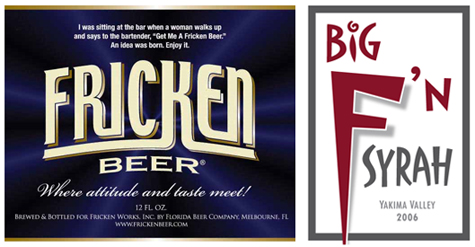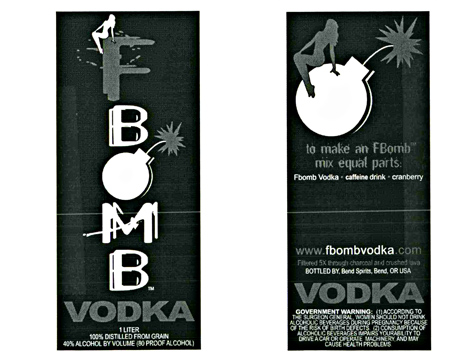There are lots of Santa labels of late, but this one got our attention because it combines many relevant elements in one small place. First, it is elderberry wine, and that’s fairly unusual. Second, it’s made in South Dakota, and that’s not so common. And then there is Santa. We don’t remember seeing so very many Santa Claus labels in past years. This may be because a great many states prohibit references to Santa on alcohol beverage products. The Wine Institute still discourages it, at least in wine ads.
Continue Reading Leave a Commentlegally interesting/controversial
Berry Christmas

Tags: current events, ingredients, legally interesting/controversial, origin, policy
Ass Kisser Chardonnay

Thanks to Barry Strike for bringing this label and controversy to our attention. Barry is a lawyer at Hinman & Carmichael in San Francisco, where he has practiced wine and beverage law for many years. Barry explained:
Continue Reading Leave a CommentIn mid-2008, TTB approved four wine labels with the brand name above. The wines are made in Australia and imported by Rocland Wine Imports, of California. Either TTB is developing a sense of humor or the examiner is an ardent animal lover. (Or perhaps the examiner thought this was an animal husbandry reference?) In any case, this is a good example of TTB’s approval of a label with a brand name that likely would have been regarded as profane a few years ago. Notwithstanding TTB’s apparent embrace of humorous, daring labels, some state regulators are not as enlightened. The state of Michigan recently refused to allow Big Ass brand wine to be sold in the state. Lacking any applicable regulatory or statutory basis for disapproving the label, the state claimed it was racist(?!). The Big-Ass Coalition must have applauded the state’s bold step to protect big asses everywhere.
Tags: legally interesting/controversial, policy, risqué, would you approve it?
Sparks and Caffeine: Nearly Extinguished

Sparks is all but dead. Today 13 Attorneys General announced a settlement with MillerCoors. The settlement covers this well-known brand of malt beverage with caffeine, taurine, guarana, ginseng — and essentially removes it from the US market. The old label, in use from about 2001 until today, is on the left side above. The new label is on the right. The battery symbols, caffeine (and other ingredients) are banished. The settlement calls for MillerCoors to reformulate Sparks and change the labels within three weeks. It also requires MillerCoors to pay $550,000 in fees within five days. Upon announcing the settlement earlier today, Connecticut Attorney General Richard Blumenthal said:
“Sparks is an insidious and insane drink that deservedly now is down the drain — like all stimulant-spiked alcoholic drinks should be,” Blumenthal said. “Beverages like Sparks are a witch’s brew of alcohol and caffeine, energizing drunks and encouraging dangerous, even deadly behavior. Common sense says a drink impairing judgment while conferring excess energy is a very bad idea. Studies show that these drinks lead to binge drinking, car crashes, sexual assaults and other risky behavior. They impair reactions and reasoning, but instill the illusion of alertness and energy.”
The settlement is so far-reaching, it even includes newer MillerCoors products such as Rize.
Continue Reading Leave a CommentF-Words, F-Bombs and Booze, Part 2

Yesterday we discussed a scholarly article on the F-Word, in F-Words, F-Bombs and Booze, Part 1. That post was long on discussion and short on examples, so here are several examples of approved labels, raising a similar term and topic. First and perhaps most famous is Effen Vodka. It’s possible the brand name refers to something other than what Potts is talking about, but somehow we believe they are thinking of roughly the same thing. As Potts explains, this term has always been mired in ambiguity, and that accounts for much of its power and popularity. The ambiguity also, we suppose, helps it get approved. Second is Fricken Beer, as above. Indian River Brewing, of Melbourne, Florida, is hoping you too will walk up to the bartender and say “Get me a Fricken Beer.” If you don’t get slapped, it might be refreshing. Third is Big F’n Syrah. It is a robust Yakima Syrah with overtones of the F-Word. We have a few additional F-Word labels but please let us know if you see others.
Continue Reading Leave a CommentTags: legally interesting/controversial, policy, risqué, sexual, sin, speech, would you approve it?
F-Words, F-Bombs and Booze, Part 1

Cary Wiggins alerted us to a recent, scholarly article about, of all things, the F-word. His blog, called Meeting the Sin Laws, covers the intersection of sin, vice, alcohol beverages, and the law.
Wiggins points to The Connotations of the F-Word. This is a post in The Language Log; it is a blog run out of the University of Pennsylvania since 2003. The post is by Chris Potts, a Professor of Linguistics at the University of Massachusetts, Amherst. He wants to get a better understanding of why people tend to remain so fascinated with this term (and other “taboo vocabulary”). He wants to know:
Does it in fact have sexual connotations even when used as an intensive, as in Bono’s “really, really f-ing brilliant”?
Ed. note: F-word modified. It’s not an idle topic; the FCC needs to grapple with this and so does TTB. Potts applies some fancy academics to this not so fancy topic, with cosine measures, cooccurrences, fleeting expletives, formal linguistic theories, latent semantic analysis, and even rubrics of framing. He does not necessarily conclude that the term has much to do with sex.
This topic has a fair amount of relevance here, because this terminology pops up on alcohol beverage labels more often than you...
Continue Reading Leave a CommentTags: legally interesting/controversial, media buzz, policy, risqué, sexual, sin, speech, would you approve it?
New Label Rules; Consumer Groups Press Obama Administration

On December 11th, several consumer groups submitted a letter to Treasury Secretary-Designate Geithner, urging fast action to require a great deal more information on beer, wine and spirits labels. The letter urges TTB and the Obama Administration to:
act now to issue a final regulation to require the following information on all beer, wine, and spirits labels: serving size, calories per serving, alcohol per serving, percent alcohol by volume, the definition of a “standard drink,” number of drinks per container, and the Dietary Guidelines recommendation on moderate drinking. TTB also should consult with FDA as to the most effective format and graphic design for the “Alcohol Facts” label.
The four consumer groups are the Center for Science in the Public Interest, the Consumer Federation of America, Shape Up America!, and the National Consumers League. They say they have been waiting more than five years since submitting their petition to change these rules. TTB’s 2007 proposed rule, and thousands of comments, are here.
Continue Reading Leave a CommentTags: legally interesting/controversial, media buzz, policy, serving facts/allergens

